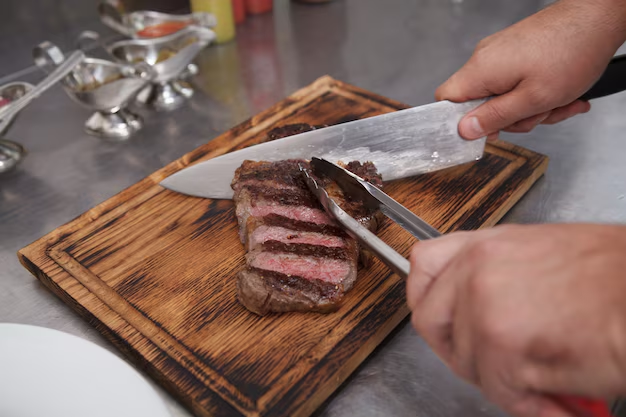How Long is Too Long? A Comprehensive Guide to Marinating Steak in the Refrigerator
Imagine this: You're planning a perfect steak night. Your secret marinade recipe is ready, and your steak is nestled in the fridge, soaking up those rich, flavorful juices. But a question lingers—just how long should it stay there? Is there such a thing as marinating for too long? If you've ever pondered these questions, you're in the right place. Let's dive into the tantalizing world of marinating steak and unravel how long it should truly sit in the refrigerator.
Understanding the Basics of Marinating
Marinating is more than just an added step in preparing meats; it's a culinary tradition that transforms flavor and texture. Marinating involves soaking foods in a seasoned liquid mixture to infuse them with flavor and sometimes act as a tenderizer. For steak enthusiasts, a good marinade can make the difference between a mediocre meal and an unforgettable dining experience.
Why Marinate?
- Flavor Infusion: Marinades imbue steak with delightful aromas and tastes, turning each bite into a flavorful experience.
- Tenderization: Some marinades contain acidic substances like lemon juice or vinegar, which can tenderize tougher cuts of meat.
- Enhanced Juiciness: The oils in a marinade can help retain moisture, making the steak succulent and moist.
Ideal Marination Time for Steak
The big question remains: How long should steak be left to marinate in the refrigerator to achieve the perfect balance of flavor and texture without compromising food safety?
Short vs. Long Marination
- Short Marination (Up to Two Hours): Ideal for thin cuts like flank steak or if you are short on time. Quick marinades can provide a burst of flavor without risking textural changes.
- Moderate Marination (2 to 8 Hours): Commonly recommended for most steak cuts, this duration balances time and flavor perfectly. It allows the marinade to seep into the steak without over-tenderizing.
- Extended Marination (8 to 24 Hours): Suitable for thicker, tougher cuts. However, exercise caution as acid-heavy marinades may begin to break down proteins, potentially affecting the texture.
When is Marinating Too Much?
While marination sounds beneficial, too long in acidic marinades can lead to mushy texture. Generally, marinating for more than 24 hours is discouraged for most steaks. Over-tenderized meat can lose its texture and have an unappealing, mushy mouthfeel.
Tips for Marinating Success
Ensure your steak remains flavorful and safe with these handy tips:
- Use Glass or Food-Grade Plastic: Avoid metal containers, which can react with acids and affect flavor.
- Control Refrigeration Time: For safety, always marinate in the refrigerator to slow bacterial growth.
- Use Fresh Ingredients: A fresh marinade enhances flavor and minimizes food safety risks.
- Pat Dry Before Cooking: Remove excess marinade before cooking to promote even browning.
Key Ingredients in Marinades
Choosing the right ingredients is crucial for a successful marination process. Let's explore the components of a classic marinade and their roles:
Acids
Acids, such as citrus juice or vinegar, break down muscle fibers and tenderize meat. However, moderation is key to prevent over-softening.
Oils
Oils, like olive or sesame oil, aid in moisture retention and flavor permeation, balancing out the tartness of acidic components.
Flavor Agents
Herbs, spices, garlic, or soy sauce impart distinctive flavors, adding depth and complexity to the steak.
Sweeteners
Adding a touch of sugar or honey balances acidic notes and assists in creating a caramelized crust during cooking.
Safety First: Handling and Storing Marinated Steak
Safety is paramount when dealing with marinated steak. Following these guidelines can assure you of a deliciously safe meal:
Refrigerate Always
Always refrigerate steak while it marinates, regardless of duration, to inhibit bacteria growth.
Avoid Cross-Contamination
Use separate utensils for raw and cooked meat, and never reuse marinade that has been in contact with raw meat without boiling it first to eliminate harmful bacteria.
Cooking Temperatures
Ensure the internal temperature of steak reaches the recommended safe levels, which is at least 145°F (63°C) for beef, followed by a three-minute resting time.
Visual Summary of Marination Tips 🥩
Here's a quick reference to keep your steak marinating like a pro:
- 🕒 Marinate Time: 2 to 24 hours based on cut thickness and marinade components.
- 🧪 Container Choice: Glass or food-safe plastic to prevent reactions.
- ❄️ Refrigeration: Always marinate in the fridge, not at room temperature.
- ❌ Over-marinating: Avoid exceeding 24 hours to maintain texture.
- 🔥 Dry Before Cooking: Pat steaks dry for the best sear.
- 🧴 Reuse Wisely: Never reuse marinade without boiling it first.
Delicious Next Steps
With a firm understanding of marinating's intricacies and safe practices, you're well-equipped to embark on a flavorful steak journey. Experiment with diverse marinades to discover tastes and textures that tantalize your palate. Explore tenderizing options from everyday staples, like balsamic vinegar to ginger-infused concoctions. Each variation adds a bespoke element to your dish, creating meal experiences that delight again and again.
In conclusion, understanding how long steak can marinate in the refrigerator can elevate your culinary repertoire significantly. Whether crafting a quick evening meal or preparing for a gourmet dinner, mastering marination helps unlock your steak’s full potential. With safety and flavor at the helm, you can relish exceptional steaks that make every dining experience memorable.

